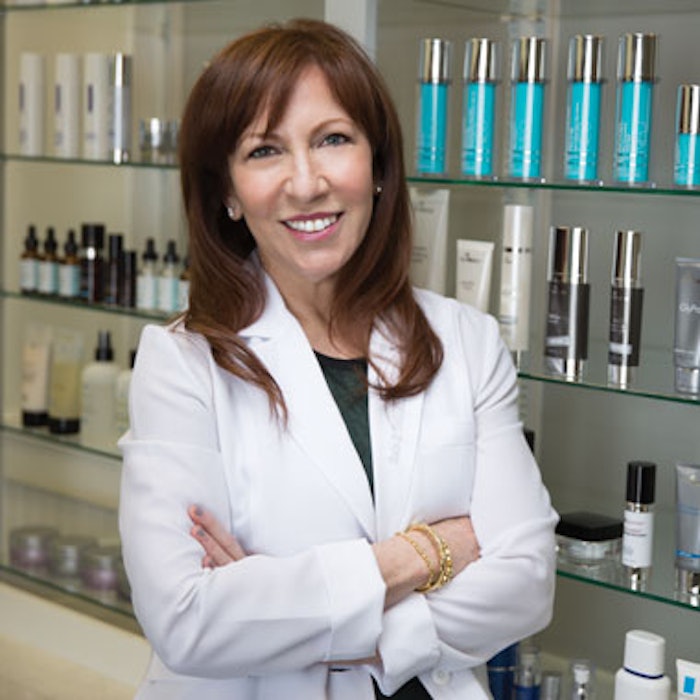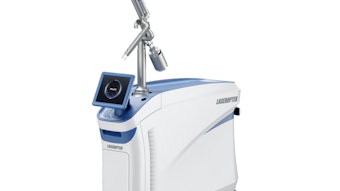
Ruth Tedaldi, MD’s path to medicine was forged in childhood. Her brother Mark Ehrman, MD, MSc, JD—“Whom I idolized,” she remembers with a smile—is a doctor and to her, it seemed the natural career path. Today, she is the founder of Dermatology Partners in Wellesley, Massachusetts, a dermatology practice that provides cosmetic procedures, and both pediatric and adult clinical dermatology treatments. She is also a frequent guest expert on local radio and television shows.
“Initially, I wanted to be a child psychologist,” says Dr. Tedaldi. “I love kids and I had a somewhat dysfunctional family, so I wanted to help young children navigate their lives.”
After completing her undergraduate studies at Harvard University, she entered medical school at the University of Pittsburgh School of Medicine. In her third year, she was invited to work with psychoanalyst Anna Freud (daughter of Sigmund Freud) in London. “Working in her nursery school in London was one of the most thrilling things I ever did,” says Dr. Tedaldi.
Upon her return to the U.S., she was hit with a career-changing development. The psychoanalytic training program at the University of Pittsburgh had been replaced “with a much more biopharmacologic behaviorist approach to psychiatry,” says Dr. Tedaldi. “I was entering my fourth year of medical school and I was heartbroken, because I was not interested in that type of psychiatry. I believed in a ‘Let’s talk about it’ approach to care, rather than a ‘Let’s medicate it’ one.”
She shifted her specialty to pediatrics and completed a residency program at Massachusetts General Hospital. But Dr. Tedaldi’s plans shifted again during her third year when she entered an elective pediatric dermatology residency with Barbara Gilchrest, MD. “I was smitten with dermatology,” she says. “It is a very interesting specialty because you can see the organ. I love that visual component.”
The emphasis on patient education and communication also appealed to her. “You need to educate your patients, and the physician-patient relationship is absolutely essential to dermatologic care,” she says. “I always enjoy talking with people, being around people and helping them. I didn’t view myself so much as a scientist but as a humanist, and that’s the way I approached becoming a physician.”
After working with Dr. Gilchrest, Dr. Tedaldi moved to a dermatology residency at Cornell University’s New York Hospital. “I started as an experienced resident, having finished three years of pediatrics, so I was comfortable in any ICU or emergency room. But when I walked into my first dermatology lab, I couldn’t even understand the words they were using. I truly had to learn a new language,” she says.
After completing her residency in 1986, Dr. Tedaldi opened a private practice in Wellesley, Massachusetts. “I was really focused on pediatric dermatology, and most of my referrals came from colleagues who had practiced pediatrics with me,” she says. “I’d see the children and then their parents as they started to age. I was in private practice alone for five or six years before cosmetic dermatology really started to blossom.”
She hired her first associate at Dermatology Partners about 25 years ago. “I now have three partners and two associates,” she says. “I don’t limit my practice to cosmetic dermatology but it certainly does account for about 95% of my patient base. I have patients who started out with me for their body checks and skin cancers—and even some pediatric patients who have now grown up still come to see me. For the last 10 years, my main focus has been on cosmetic dermatology.”
Photo by Bryce Vickmark.
[pagebreak]
Building a Loyal Patient Base
Relationships—and the loyalty they foster—are key to Dr. Tedaldi’s success. She depends on word of mouth to attract new patients. “If you educate patients about what’s available, what makes sense and what doesn’t; if you’re honest about your perceptions and your skills, and you are able to convey that accurately to your patients, your practice grows,” she says.
In addition to enjoying the artistic aspects of cosmetic dermatology, Dr. Tedaldi finds that her distinctive background in psychology as well as dermatology makes her uniquely qualified to help these patients achieve the best outcomes. “It’s completely fascinating and wondrous not only because I can help people feel better about themselves, but because I can bring beauty into my work,” she says.
There are, however, patients she will not accept into the practice. “There’s no question that cosmetic procedures are very addictive,” says Dr. Tedaldi. She has turned away patients who have asked her to do things with which she is not comfortable, as well as those who ask for enhancements that will make them look like what she feels is a caricature. “When you get that first taste of looking a little bit better, it is a seductive experience,” she says. “Someone has to reign you in. While it’s wonderful to look a little bit better and feel better about your appearance, I try very hard to maintain perspective. I’m known for undertreating my patients and trying to make them look the best they can for their age. I never want to distort a patient’s appearance or make them look unusual. I’m enormously interested in skin care and improving the quality of the skin.”
Dr. Tedaldi’s passion for topical skin care led her to launch a new company with Patricia Farris, MD, a New Orleans-based dermatologist. RegimenMD (www.regimenpro.com) is a web-based skincare company that carries several different lines. Doctors can develop homecare regimens for their patients and then the patients order the products online, so the practices don’t have to carry inventory.
“Patients undergoing cosmetic procedures really need to do everything they can at home to optimize the procedure’s success,” says Dr. Tedaldi. “Little things like topical antioxidants and sunscreens, retinols and growth factors are so important. We can perform injectables and laser treatments, but if patients aren’t taking care of their skin every single day, they’re really not going to maximize the potential for beautiful, healthy skin.”
Education and Communication
Patient education is a core component of care at Dermatology Partners. “For example, I show patients pictures of what a blepharoplasty does to their eyes and how removing too much tissue can make their faces look more hollow as they age,” says Dr. Tedaldi. “Increasing volume to a certain extent is good, but it’s all about subtly reshaping the face and helping patients accept the fact that their faces are changing.”
As injectables become increasingly abundant and popular, Dr. Tedaldi cautions patients and providers to recognize and understand their limitations. “The face is meant to move. The second you put too much neurotoxin in, you create an unnatural look,” she says. “Movement is a part of life and if you erase that, you’re taking the human qualities away. We lose a lot of volume as we age. Many physicians try to re-volumize patients with fillers to the point that they look the way they did 15 or 20 years ago, and that’s not always age appropriate. A 60-year-old woman does not have the natural fat that a 25-year-old woman has, so what we end up seeing is older women who have these ballooned, Michelin tire faces and it looks odd.
“You have to be grounded and help patients make decisions,” continues Dr. Tedaldi. “I have a magic wand in every room. When a 60-year-old woman shows me a picture of herself from high school, I wave the magic wand at her and tell her I’ll make her look her absolute best but I’m not going to alter her appearance.”
Photo by Bryce Vickmark.
[pagebreak]
Dr. Tedaldi instills realistic expectations by discussing desired outcomes in terms of aging gracefully and helping patients embrace rather than fight the fact that they are now older and wiser. “I can tell her what I like, what I think looks best on her and what the dangers are with procedures, and hopefully guide her to make a well-thought-out decision,” she says.
Challenges and Inspiration
For Dr. Tedaldi, one of the biggest challenges of running a successful private practice is time management. “Getting to know your patients is so important that I often run behind—I never want to rush anybody. I always want to give 100% because I want my patients to truly believe that they’ve received my best effort,” she says. “The same goes for my staff. We’re all individuals and we all come to the table with different skills and different needs. It’s my job as the head of the practice to manage those needs.”
Her goal is to make sure that when her providers and employees leave at the end of the workday, they feel that they had the time and the tools to do a good job with everyone. "Patients obviously come first, then your staff and colleagues, and then your spouse and family,” says Dr. Tedaldi. “It’s hard to treat everybody with the sincerity of purpose that you need to, but the rewards of these relationships are what keep me going.”
She has four grown sons and an “amazingly wonderful husband who inspire me every day,” says Dr. Tedaldi. “My sons’ individuality and abilities have opened my eyes to novel ways of looking at issues, which has been incredibly important and life altering.” As for mentors? You might expect a notable physician or scientist in the field, but Dr. Tedaldi’s most formative figure is her mother. “She was my strongest mentor. My mother was an incredibly bright, strong, independent woman with a wonderful sense of humor,” she says. “She instilled in me purist, ethical values about being productive and contributing to society. Because of that, I thrive on being busy and productive. I can’t see myself retiring.”
Dr. Tedaldi is enthusiastic about the future of dermatology. “The amount of R&D that goes into the procedures, devices and products is growing faster than any of us could have predicted,” she says. “As dermatologists, we have the opportunity to see something on the surface and delve into the machinery of what makes it happen.” The shifting emphasis in cosmetic medicine from distortion of a patient’s features to preserving a more natural look is a positive evolution that she feels allows providers to better serve their patients.
For new practitioners, Dr. Tedaldi stresses the importance of broadening your education throughout your career. “It’s very easy to become overspecialized. Don’t lose your verve for education in all fields,” she says. “You won’t be able to relate to the rest of the world if you don’t grow in a variety of fields related to what you’re practicing. I’m very lucky. I get up every day excited about what I’m going to learn and how I’m going to get better at what I do. Don’t be afraid to experiment and grow.”
Shelley Moench-Kelly, MBA, is a freelance writer based in Newport, Vermont.
Photo by Bryce Vickmark.











